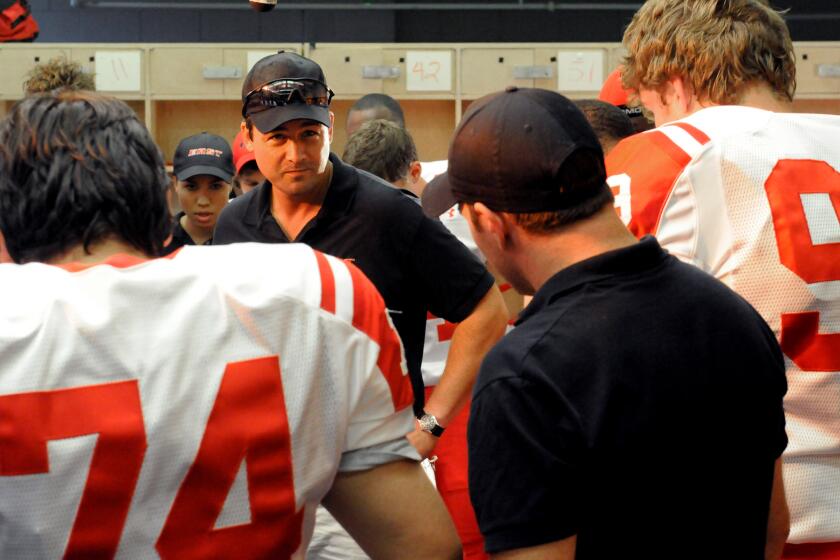EXTRAMARITAL AFFAIRS : MINISERIES ADDS FUEL TO KENNEDY, KING STORIES
Yet another saga about the Kennedy era is on the television horizon. This time: a triple-tiered “docudrama” about John and Robert Kennedy, their difficult dealings with the late FBI director J. Edgar Hoover, and the relationship of all three men to Dr. Martin Luther King Jr. and the civil rights movement of the 1960s.
The four-hour TV miniseries, “Hoover vs. The Kennedys: The Second Civil War,” recently completed production in a film studio here, with plans for a fall broadcast on the nearly 100 independent television stations around the country that form the loosely knit network known as Operation Prime Time (OPT).
Judging from a visit to the set here, the project is bound to cause controversy; in fact, it already has.
According to producer Daniel Selznick, the miniseries is a direct outgrowth of “Blood Feud,” the 1983 OPT miniseries about the tempestuous relationship between Atty. Gen. Robert F. Kennedy and the late Teamster Union leader James Hoffa. Selznick and his longtime partner Joel Glickman produced the previous Kennedy TV saga, and the two men have teamed with Toronto-based producer Paul Saltzman to mount the current miniseries--budgeted, according to Selznick, at $8 million.
“This is a lot hotter,” promised Selznick, pointing out that insurance on potential legal damages resulting from the miniseries cost $5 million, as compared to $1 million for the Kennedy-Hoffa story. “We are including a lot of facts that just recently have become known and we’re entering a lot of sensitive areas,” he added.
Discussing the nearly five-year development of the project and the details of the final shooting script here recently, Selznick said some aspects of the story spanning eight tumultuous years of American history, 1960-68, are so sensitive that two versions of the completed miniseries are planned. One is for foreign broadcast markets and another, expurgated along lines suggested and in some cases demanded by OPT officials, for broadcast in this country.
“There’s a valid case to be made for a (different) U.S. version,” acknowledged Selznick.
The nature of the sensitive material? In most cases, explicit sexual references to extramarital relations on the part of both President Kennedy and King. Selznick specifically cited “a shower scene” involving Kennedy and the late Marilyn Monroe, which he said will be included in the unexpurgated version of the miniseries, but altered for the U.S. broadcast to represent “a Jacuzzi scene.”
He said that Kennedy, played in the miniseries by Robert Pine, will be seen stepping out of the Jacuzzi, dressed in a bathing suit, while Monroe, played by Heather Thomas, will be seen sitting on the side of the Jacuzzi, robed.
Selznick said that OPT insisted that “all” explicit references to King’s extramarital relations--the producer said there were three such scenes planned for the miniseries--be deleted from the American version.
Both Selznick and Saltzman repeatedly said that they wanted to include the provocative, intimate details of Kennedy’s and King’s alleged behavior because “Hoover was obsessed by such sexual behavior, and used the information to hold over (the two leaders and his dealings with them), and also because (their behavior) was well-documented.”
The producers also maintained that these private aspects of the men’s lives “makes them more human.”
“I’d like to think that I am one who is sensitive to such portrayals,” said Selznick, who is the son of the late, legendary Hollywood producer David O. Selznick. He said that he once considered bringing legal action against the producers of another TV miniseries, “Moviola,” because the drama inaccurately portrayed his father in a romantic alliance with the late Joan Crawford.
“We have not included all of this (behavior) because it sensationalizes, but because it’s all part of the true story,” said Selznick.
The producers cited other controversial elements of the drama, such as connections made between organized crime and the 1960 presidential campaign, as well as the Kennedy assassinations; also, scenes linking Hoover and the FBI to “cover-ups” of evidence on the assassinations.
Selznick said negotiations still were under way with OPT officials to determine what material would be included in the American version of the miniseries.
“The first and most important goal is to get this on the air, which is a small miracle in the first place,” said Selznick, adding, “if we have to clean up our act a bit, in order to be accommodating, it’s a small price to pay.”
Selznick said that he personally conducted most of the research and “first-person interviews” that have led to the current script by Lionel E. Seigel, veteran writer of such TV series as “Peyton Place” and “Rich Man, Poor Man.” The miniseries is being directed by Michael J. O’Herlihy, whose TV credits include the miniseries “Backstairs at the White House.”
Selznick cited numerous books about the Kennedy years; in particular, John Davis’ “The Kennedys: Dynasty and Disaster,” on which he said he has based most of the “revelations” about the role of organized crime included in the miniseries. But the producer, who also has worked as a journalist, stressed the importance of direct interviews with living participants in the Hoover-Kennedy-King saga. He said that still others read and commented on the script.
“I took a deep breath, and hoped that key people would agree to see me,” recalled Selznick, noting that he had been in “the doghouse,” especially with “the Kennedy people,” as a result of “Blood Feud.”
He said that “a curtain of silence” already had descended on part of the Kennedy family, so that he did not attempt to interview family members for the current project. He also said that he did not attempt to contact King’s widow, Coretta Scott King, because “we were dealing with the delicate subject of King’s extramarital relationships.”
Among the key people interviewed for the project, according to Selznick, were: Burke Marshall, a former member of the Kennedy Administration; Clarence Jones, a King “confidant” and a close observer of the civil rights movement; Harris Wofford, another member of the Kennedy Administration and a special assistant to President Kennedy in the civil rights area; and Courtney Evans, who served under Hoover at the FBI. Evans was present on the Toronto set.
The principals present at the time of the recent visit to Toronto differed in their opinions about the slant the miniseries was taking on the key historical figures. Jack Warden, who plays Hoover, said the former FBI chief was portrayed fairly, even “heroically,” from Hoover’s point of view.
LeLand Gantt, the young actor cast as King, said his character and his personal behavior was portrayed “realistically” and made King seem “more human.”
And actor Nicholas Campbell, a dead-ringer for Robert Kennedy, said the miniseries posed the former attorney general as “the good guy,” Hoover as “the bad guy,” and presented both President Kennedy and King as men who were capable of “mistakes and indiscretions.”
“Of course, there have been a lot of other Kennedy dramas,” said Selznick. “All we’re trying to do is get a little bit more to the real truth, with as little ambiguity as possible, and, hopefully, with no cop-outs, because, after all, these years marked a turning point in American history.”
The complete guide to home viewing
Get Screen Gab for everything about the TV shows and streaming movies everyone’s talking about.
You may occasionally receive promotional content from the Los Angeles Times.



